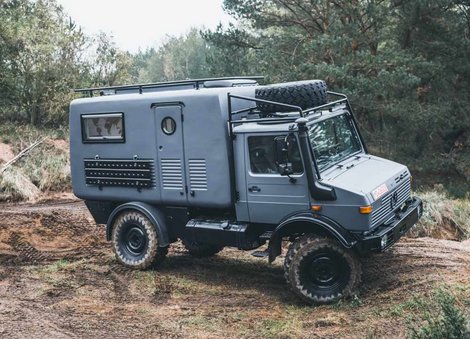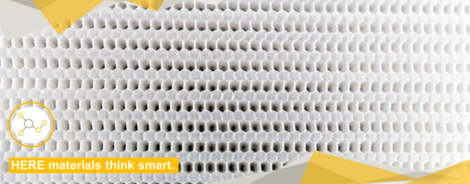Driving On Where Others Would Turn Back

Polygon Shelter from Saxony-Anhalt builds unique, lightweight expedition vehicles for customized adventure
A cork map of the continents hangs in the cabin of the expedition vehicle made by Polygon Shelter, a young company based in Magdeburg. This world map is a clear indication of who the small manufacturer builds their unique vehicles for: people who want to go out and explore the world in their own vehicle, who want to drive along what you would be hard-pushed to call tracks and take on hills that would prove too much for other all-wheel drives. “Our expedition vehicle is lightweight, compact, robust and suitable for mountainous, off-road terrain. What’s more, it offers the comfort of home on the road,” says Sascha Reiche, one of the founders of Polygon Shelter.
Compact and functional lightweight design
Reiche, who has a PhD in industrial engineering, founded the vehicle manufacturing company in Saxony-Anhalt together with his friend Mathias Herms and wife Catharina Reiche in 2019. Polygon Shelter manufactures its lightweight and functional expedition vehicles on the basis of the Mercedes Benz Unimog carrier truck. Its vehicles can drive anywhere where others would have to turn back. The lightweight design of the cabin plays an important role in that. “Instead of a traditional square box, we manufacture our cabins in an organic, polygonal shape modeled on the structure of honeycomb. The cabin is built as a one-piece fiberglass composite sandwich with a special surface coating. Campers are normally built using sandwich panels with plastic or aluminum angle sections. The lightweight vehicle cabin is compact and functional. It is from one cast and in a monocoque structure, achieving maximum stability and low weight at the same time,” explains company founder Mathias Herms. The optimized expedition vehicle from Saxony-Anhalt has a curb weight of 5.5 metric tons. With a full 400-liter fuel tank, 300 liters of fresh water and a typical load, it weighs 6.5 metric tons. Comparable vehicles made by competitors are often significantly above 7.5 metric tons.
The idea of building an optimal expedition vehicle came from the three founders’ own love of traveling through rough terrain and being self-sufficient. The concrete business idea came about in 2015, when Catharina and Sascha were traveling around Iceland in an off-road vehicle they had converted into a camper. “We hit the limit of what our own vehicle could manage and often had to turn back. We came across travelers in converted Unimogs. For us, the Unimog is the vehicle to have when you need the right driving dynamics for rough terrain,” says Catharina.
Powered by fresh ideas
When it came to developing the vehicle, the team was powered by fresh ideas: they felt that the ubiquitous box shape for the truck body and the principle of making everything as big as possible was incompatible with the unique driving characteristics of a Unimog. That’s why they developed the functional, lightweight polygon cabin. “We wanted to combine the driving dynamics of a proper off-road vehicle with the comfort of a premium, well-equipped camper – a happy medium for the sublime experience of independent travel,” says Sascha, the company’s managing director development engineer.
The team got to work on ideas and plans in 2017, with help and financial assistance from the Otto von Guericke University Magdeburg and the state of Saxony-Anhalt. In 2019, they founded their company Polygon Shelter GmbH & Co. KG. It now employees nine people with expertise in furniture manufacturing, design, vehicle mechanics and electrics. The company focuses on its own strengths, converting the entire vehicle by itself. This enables complementary, coordinated manufacturing processes. The result? Quality and innovation remain affordable.
To ensure that travelers can be fully independent on their journeys, Polygon Shelter’s vehicles are fitted with maximum off-road reserves. High-quality standards in interior construction, with space-efficient, sophisticated solutions, are particularly important: that means avoiding an oversized living space, for example, and following the principle of “as little as necessary and as little as possible.”
Aiming for small series production
Polygon Shelter is constantly improving its product. Since 2019, it has been involved with a joint research and development project in collaboration with Modell und Formenbau GmbH Sachsen-Anhalt that is funded by the state of Saxony-Anhalt and the European Union. “In the medium term, we want to manufacture our vehicles in small series and in the long term to establish ourselves here in Saxony-Anhalt as leaders in lightweight engineering. We are also planning a rental model for our vehicles as the demand for special tour vehicles is growing in this sector. Our hope and aim is to transfer the balance between robustness, lightweight design and cost efficiency to other areas of application, such as humanitarian aid,” says Catharina.
Three Polygon Shelters have so far been manufactured in the vehicle factory. Their owners have recently toured Lapland, the Baltic countries and the Carpathian Mountains. One of them is planning a trip to Mongolia with like-minded travelers and their vehicles. That means the first few thumbtacks have already been stuck into the world map hanging in the Polygon Shelter’s cabin.
Autor: Michael Falgowski/IMG Sachsen-Anhalt

One can rightly claim that Saxony-Anhalt is an innovative commercial and scientific site for smart materials. Here, innovations for the global market are created with entirely different approaches. HERE materials think smart.
